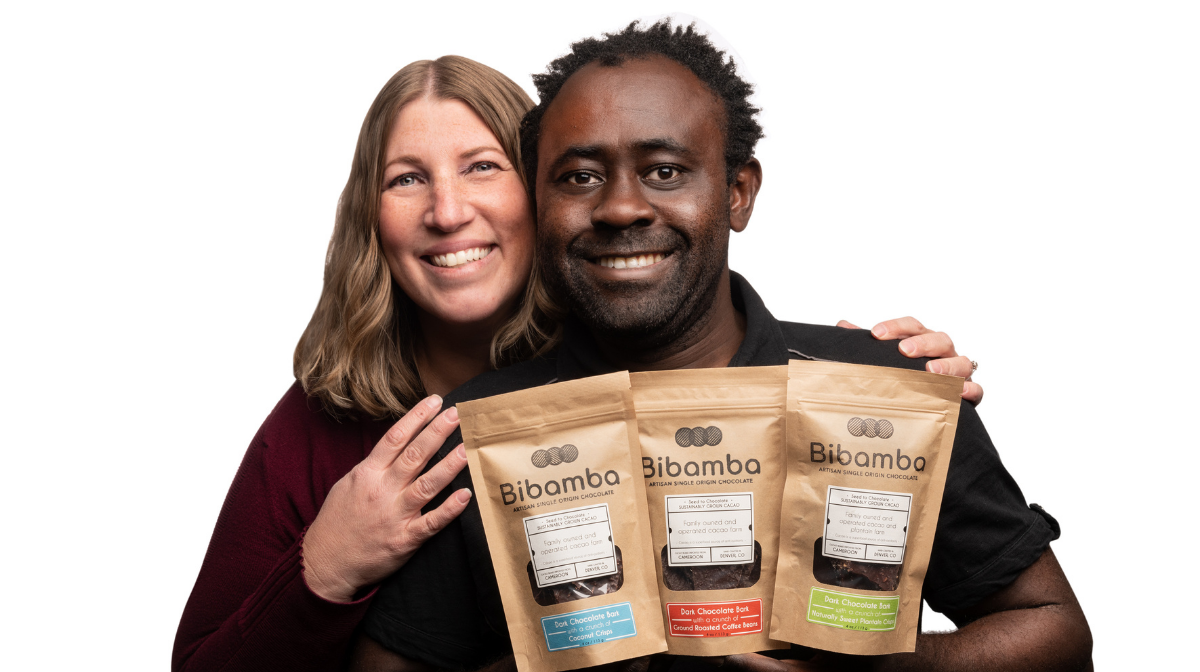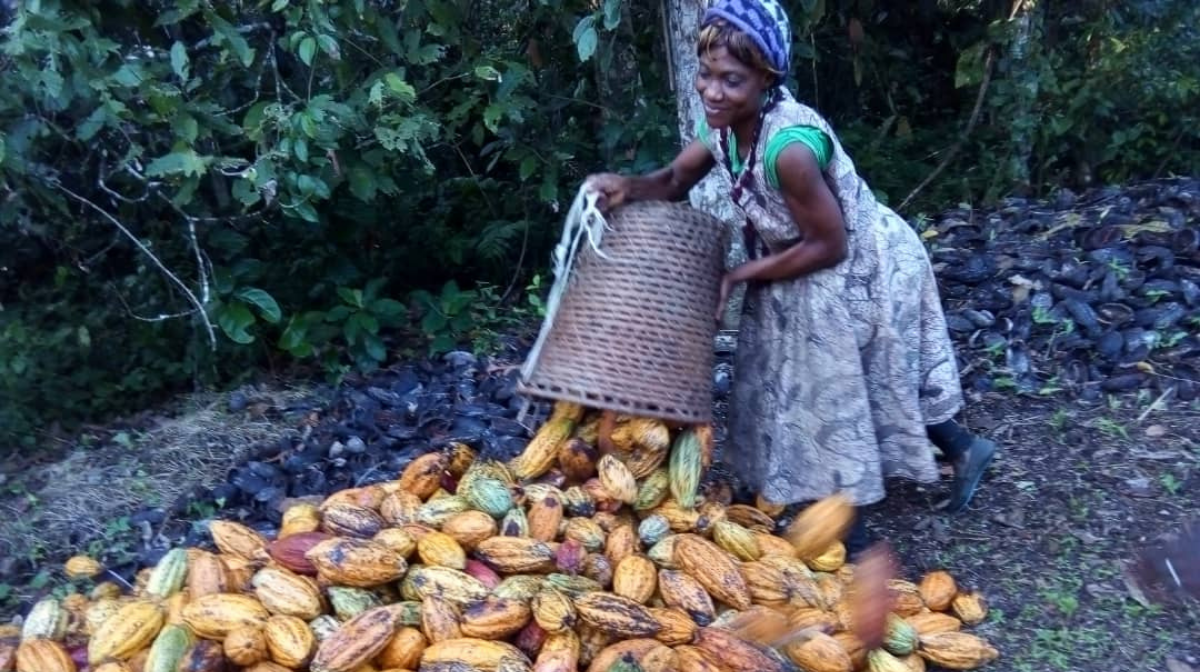
Courtesy of Bibamba Chocolate

Audio By Carbonatix
Bibamba means “patch” in Lingala (a language of central Africa), like something you would use to fix a hole in your pants. It’s a metaphor for a snack, something that will hold you over between meals, says Patrick Tcheunou, who owns a new chocolate company called Bibamba with his wife, Mara. But while Bibamba artisan dark chocolate can make a great snack, there’s more than a plateful of intention behind each bag.
In 2015, the Tcheunous bought two farms in Patrick’s home country of Cameroon to grow cacao and coffee beans in a sustainable manner that could also benefit the surrounding communities. Last year was their first cacao harvest, but their shipment of 1,400 pounds of beans landed in the U.S. right at the beginning of the coronavirus lockdown. They soon decided that the company was going to need to expand from supplying cacao to making its own chocolate product if they wanted the beans to be used. But now they see Bibamba’s three signature chocolate barks as only the beginning.
Owning some sort of business was always the couple’s plan, Mara explains. She and Patrick got married in 2013, and since then they’ve brainstormed ideas of where to apply their entrepreneurial spirit. Eventually, news reports on a potential shortage of chocolate as a result of climate change became the deciding factor. Patrick says the idea just stuck because cacao had always been one of his favorite foods, and he had childhood memories of visiting his grandparents’ farms in the summers. “I kind of remember [him] waking up…and saying, ‘Why don’t we start a farm?'” says Mara.
Though the Tcheunous live in Denver, they found employees in Cameroon to help them farm their new enterprise. Cameroon is known for its diverse ecosystems that include mountainous regions, savannas, jungles, deserts and the sea. That variety lends itself to the cultivation of many crops, depending on the location of the farmland. So the Tcheunous bought fifty acres in Ouassa-Baboute, in the central province of Nkoteng, to farm approximately 30,000 to 50,000 cacao trees, and another thirty acres in Bui, located in the northwest province of Nkishong, to grow about 20,000 coffee trees.

Cacao fruit grown on the Tcheunous’ farm in Ouassa-Baboute, Cameroon.
Courtesy of Bibamba Chocolate
All of their plants were started from seedlings in 2015 to eventually provide coffee and cacao for their wholesale supplier business, Smart Globe International LLC. The goal of the business, in addition to selling coffee and cacao, was to prioritize innovation, sustainability, gender equity, support for the local economy and education opportunities. For example, on the cacao farm they also planted plantain, mango and avocado trees to contribute shade and biodiversity to the farm.
The company also supports organizations helping interns study farming methods to improve agriculture throughout Cameroon. The Tcheunous hope sustainable methods can help Cameroonian farmers and families save money in the long term and improve their self-sufficiency.
About ten people work full-time on the cacao farm, and one person mans the coffee farm. The combination of high altitude and political conflict in the Nkishong region has kept coffee production a little bit further behind the cacao production, Patrick says. But they anticipate harvesting around 200 pounds of coffee beans this season.
Last season’s cacao crop, harvested between October and January, produced approximately six metric tons that are currently being fermented and dried before they’re shipped to Denver sometime between March and May.

This season, the Tcheunous expect approximately six metric tons of cacao beans to be shipped to Denver from their farm in Cameroon.
Courtesy of Bibamba Chocolate
And when the cacao beans arrive in Denver, they will be passed on to Patrick to create more Bibamba chocolate bark. He approaches making chocolate like a scientist, Mara explains, reflecting his degree as a chemical engineer. “I’m a little more artsy,” she continues. But together they designed a natural chocolate bark that’s meant to capture their “seed to chocolate” philosophy, where every piece is unique.
Bibamba’s three varieties are infused with coffee beans from Denver roasters, plantains from the cacao farm and coconut from a producer in Cameroon. And even though it wasn’t their original intention to concoct their own chocolate, they’ve noticed the different flavors that come from beans grown in different locations around the farm; its microclimates produce different tastes and aromas. Patrick hopes to explore those nuances between flavors. “Chocolate can produce more flavors than wines,” he says.
The Tcheunous have also enjoyed getting to know the Denver community through selling their chocolate at farmers’ markets. “It’s satisfying that what we’re doing matters to people,” Mara notes, “that something’s resonating…that people want to know where [their] food comes from.”
And they also make sure to send some of the finished product back to Cameroon. It can be commonplace for workers to produce cacao beans without ever tasting the finished product. “Somebody just comes and picks it up,” Patrick says. “It’s cool to be able to bring some chocolate back so that people can actually taste it.”
Visit the Bibamba website to order chocolate and to find a list of stores where the products are sold. Bibamba chocolates will also be sold at local farmers’ markets this summer.